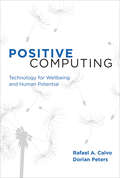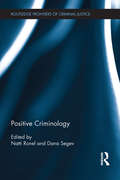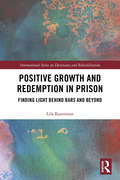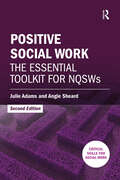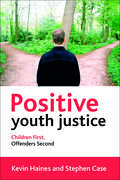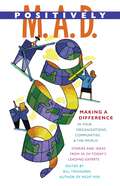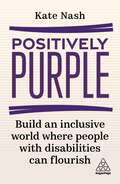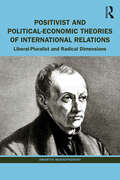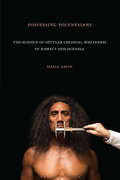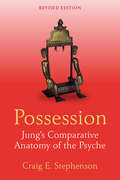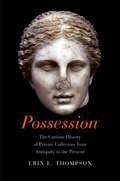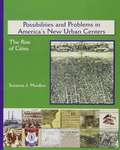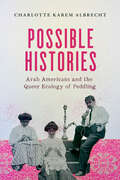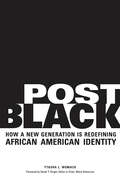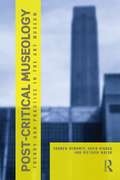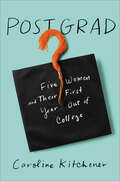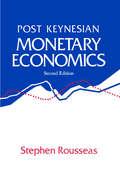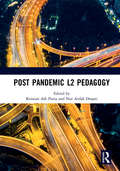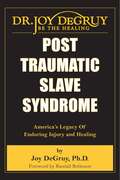- Table View
- List View
Positive Computing: Technology for Wellbeing and Human Potential
by Rafael A. Calvo Dorian PetersA case for building a digital environment that can make us happier and healthier, not just more productive, and a theoretical framework for doing so.On the eve of Google's IPO in 2004, Larry Page and Sergey Brin vowed not to be evil. Today, a growing number of technologists would go further, trying to ensure that their work actively improves people's lives. Technology, so pervasive and ubiquitous, has the capacity to increase stress and suffering; but it also has the less-heralded potential to improve the well-being of individuals, society, and the planet. In this book, Rafael Calvo and Dorian Peters investigate what they term “positive computing”—the design and development of technology to support psychological well-being and human potential. Calvo and Peters explain that technologists' growing interest in social good is part of a larger public concern about how our digital experience affects our emotions and our quality of life—which itself reflects an emerging focus on humanistic values in many different disciplines. Synthesizing theory, knowledge, and empirical methodologies from a variety of fields, they offer a rigorous and coherent foundational framework for positive computing. Sidebars by experts from psychology, neuroscience, human–computer interaction, and other disciplines supply essential context. Calvo and Peters examine specific well-being factors, including positive emotions, self-awareness, mindfulness, empathy, and compassion, and explore how technology can support these factors. Finally, they offer suggestions for future research and funding.SidebarsTimothy N. Bickmore, Jeremy Bailenson, danah boyd, Jane Burns, David R. Caruso, Mihaly Csikszentmihalyi, Felicia Huppert, Mary-Helen Immordino-Yang, Adele Krusche and J. Mark G. Williams, Jane McGonigal, Jonathan Nicholas, Don Norman, Yvonne Rogers
Positive Criminology (Routledge Frontiers of Criminal Justice)
by Natti Ronel Dana SegevHow can we best help offenders desist from crime, as well as help victims heal? This book engages with this question by offering its readers a comprehensive review of positive criminology in theory, research and practice. Positive criminology is a concept – a perspective – that places emphasis on forces of integration and social inclusion that are experienced positively by target individual and groups, and may contribute to a reduction in negative emotions, desistance from crime and overcoming the traumatic experience of victimization. In essence, positive criminology holds a more holistic view, which acknowledges that thriving and disengagement from distress, addiction, mental illness, crime, deviance or victimization might be fostered more effectively by enhancing positive emotions and experiences, rather than focusing on reducing negative attributes. Each chapter in this book is written by key scholars in the related fields of criminology, victimology and addiction and, thus, assembles varied and extensive approaches to rehabilitation and treatment. These approaches share in common a positive criminology view, thereby enriching our understanding of the concept and other strength-based approaches to dealing with offenders and victims. This edited book elaborates on positive criminology core ideas and assumptions; discusses related theories and innovations; and presents various benefits that this perspective can promote in the field of rehabilitation. For this reason, this book will be essential reading for those engaged in the study of criminology, criminal justice and victimology and may also assist scholars and professionals to help offenders desist from crime and improve victims’ well-being.
Positive Growth and Redemption in Prison: Finding Light Behind Bars and Beyond (International Series on Desistance and Rehabilitation)
by Lila KazemianAlthough the negative consequences of rising incarceration rates have been well-established, criminological research has largely neglected to document psychological, social, and behavioral changes that occur during periods of incarceration. Drawing on an original longitudinal study of long-term French prisoners, this book examines the process of desistance from crime and positive growth in prison. It offers reflections on how personal transformation can be achieved in prison, particularly among individuals serving long prison sentences. This research investigates the barriers to achieving positive growth in prison, as well as the different ways in which transformation can occur behind bars. It also conceptualizes the process of abandoning crime in prison, and sheds light on the cognitive, social, and structural factors that may trigger, accelerate, or hamper this process. This book explores the circumstances under which individuals can thrive in prison, and identifies key features of the narratives of prisoners who have achieved positive growth. The research presented in this book also examines the intricacies of returning to society after a lengthy period of time in prison. Written in a clear and accessible style, this book will be invaluable reading for those engaged in studies of criminology and criminal justice, sociology, criminal behavior, prisons, and penology. It is also aimed at a variety of audiences, including academics, practitioners, policy-makers, and prisoners.
Positive Political Theory I: Collective Preference
by Austen-Smith David Banks Jeffrey S.Positive Political Theory Iis concerned with the formal theory of preference aggregation for collective choice. The theory is developed as generally as possible, covering classes of aggregation methods that include such well-known examples as majority and unanimity rule and focusing in particular on the extent to which any aggregation method is assured to yield a set of "best" alternatives. The book is intended both as a contribution to the theory of collective choice and a pedagogic tool. Austen-Smith and Banks have made the exposition both rigorous and accessible to people with some technical background (e. g. , a course in multivariate calculus). The intended readership ranges from more technically-oriented graduate students and specialists to those students in economics and political science interested less in the technical aspects of the results than in the depth, scope, and importance of the theoretical advances in positive political theory. "This is a stunning book. Austen-Smith and Banks have a deep understanding of the material, and their text gives a powerfully unified and coherent perspective on a vast literature. The exposition is clear-eyed and efficient but never humdrum. Even those familiar with the subject will find trenchant remarks and fresh insights every few pages. Anyone with an interest in contemporary liberal democratic theory will want this book on the shelf. " --Christopher Achen, University of Michigan David Austen-Smith is Professor of Political Science, Professor of Economics, and Professor of Management and Strategy, Northwestern University. Jeffrey S. Banks is Professor of Political Science, California Institute of Technology.
Positive Social Work: The Essential Toolkit for NQSWs (Critical Skills for Social Work)
by Julie Adams Angie SheardPositive Social Work will support and help you as a NQSW to understand your role within the context of a developing Social Work service. It will ensure that you are equipped with the knowledge and skills to do the job as best you can.Leaving university and entering the world of social work can be quite a daunting experience, though also exciting and challenging. Positive Social Work helps you as a NQSW to understand your role within the context of a constantly developing social work service. Now updated with the Knowledge and Skills statements, it ensures that you are equipped with everything you need to do the job as best you can. Positive Social Work is packed with information and resources to enable you as an NQSW to work in a professional manner, to protect yourself from the pressures of the role and to ensure you know where to look for support. This book also assists you with ongoing professional development by giving you tools you can adapt for your own area of Social Work. This book provides a unique tool designed to support your journey through the Assessed & Supported Year in Employment and is full of case studies and exercises designed to help your understanding and develop positive habits which will enhance your career.
Positive Youth Justice: Children First, Offenders Second
by Stephen Case Kevin HainesThis topical, accessibly written book moves beyond established critiques to outline a model of positive youth justice: Children First, Offenders Second. Already in use in Wales, the proposed model promotes child-friendly, diversionary, inclusive, engaging, promotional practice and legitimate partnership between children and adults which can serve as a blueprint for other local authorities and countries. Setting out a progressive, positive and principled model of youth justice, the book will appeal to academics, students, practitioners and policy makers seeking to improve working practices and outcomes and will make an important contribution to the debate on youth justice policy.
Positive: A Memoir
by Ali Benjamin Paige RawlPaige Rawl was an ordinary girl.Cheerleader, soccer player, honor roll student. One of the good kids at her middle school. Then, on an unremarkable day, Paige disclosed the one thing that made her "different": her HIV-positive status.It didn't matter that she was born with the disease or that her illness posed no danger to her classmates.Within hours, the bullying began.They called her PAIDS. Left cruel notes on her locker. Talked in whispers about her and mocked her openly. She turned to school administrators for help. Instead of assisting her, they ignored her urgent pleas . . . and told her to stop the drama.She had never felt more alone.One night, desperate for escape, Paige found herself in front of the medicine cabinet, staring at a bottle of sleeping pills.That could have been the end of her story. Instead, it was only the beginning.Finding comfort in steadfast friends and a community of other kids touched by HIV, Paige discovered the strength inside of her, and she embarked on a mission to change things for the bullied kids who would follow in her footsteps.In this astonishing memoir, Paige immerses the reader in her experience and tells a story that is both deeply personal and completely universal: a story of one girl overcoming relentless bullying by choosing to be Positive.
Positively M. A. D.: Making a Difference in Your Organizations, Communities, and the World
by Bill TreasurerFeaturing contributions by more than 50 of Berrett-Koehler's most renowned authors, Positively M.A.D. is a collection of stories about real people making real changes, large and small, in their organizations and communities. The founder of an adoption agency specialzing in placing "unadoptable" children. A former big-city mayor, the son of a convict, who now works with the children of convicts. A psychiatrist who was able to take his severely ill patients to their first Chicago Bears game by unexpectedly tapping into the kindness of the fans. An office worker who transforms a malcontent colleague with the gift of a chocolate cake. A woman who salvages used computers and donates them to Africa. These engaging, optimistic, "can do" vignettes-organized around twelve different "lessons" that provide the chapter headings-are designed to inspire people to resolve their disillusionment by getting off the couch and doing something. As editor Bill Treasurer writes, "Regardless of our station in life, each of us is entitled, and perhaps obliged, to etch our initials onto the tree of humanity. Despite the complexity of the world's problems and inadequacies, and despite our own frustration with the current state of affairs, we can indeed Make A Difference."
Positively Purple: Build an Inclusive World Where People with Disabilities Can Flourish
by Kate NashMost employers will have a workforce where at least 10% of their people will have a visible or invisible disability. And 86% of all disabled people acquire their disability during the course of their working lives. How can businesses create strategies and a company culture that includes all staff?Ensure that your company or organization doesn't become guilty of the soft bigotry of low expectations when it comes to disabled employees and customers. Learn from your disabled staff and consumers and be equipped to be a better and more dynamic organization.Kate Nash, founder of #PURPLELIGHTUP - a global movement which celebrates the economic contribution of employees with disability - will help you understand how any organization can ensure disabled staff and consumers are included and valued. Telling a fascinating story of how to make change happen and recognizing that any kind of transformation requires knowledge, determination and hard yards of campaigning, networking and deal making, you will learn how to build disability confidence throughout your organization.Positively Purple allows disabled workers to claim their rightful place centre stage as just another valuable member of the team.
Positives Altern und Prekarität: Theorie, Politik und soziale Realität im vergleichenden deutschen Kontext
by Irina Catrinel CrăciunDieses Buch untersucht positives Altern aus der Perspektive der Prekarität und zielt darauf ab, Theorien des positiven Alterns in aktuellen sozialen Kontexten zu verankern. In den letzten Jahren war die Forschung zum Thema Altern von wachsenden Meinungsverschiedenheiten zwischen Befürwortern des Modells des erfolgreichen Alterns und kritischen Gerontologen geprägt, die auf die zunehmenden Ungleichheiten, Benachteiligungen und die Prekarität hinweisen, die das Alter charakterisieren. Dieses Buch schließt eine Wissenslücke, indem es eine alternative Sichtweise auf positives Altern bietet, die durch Prekarität und deren Auswirkungen auf Projektionen zum Thema Altern informiert ist. Der erste Teil des Buches stellt das Altern in einen breiteren theoretischen und empirischen Kontext und untersucht die komplexen Zusammenhänge zwischen Ansichten über das Altern, Theorien des erfolgreichen Alterns, Politik und sozialer Realität. Der zweite Teil nutzt Ergebnisse einer qualitativen Forschung, die in Deutschland durchgeführt wurde, um die Diskrepanz zwischen den Idealen des erfolgreichen Alterns und sowohl negativen als auch positiven Ansichten über das Altern sowie Vorbereitungsstrategien auf das Altern, die durch Prekarität inspiriert sind, zu veranschaulichen. Die Ergebnisse dieses Abschnitts bieten einen soliden Ausgangspunkt für Vergleiche mit Ländern, die hinsichtlich der Wohlfahrtsregime und der Alternspolitiken sowohl Ähnlichkeiten als auch Unterschiede zu Deutschland aufweisen. Der abschließende Teil des Buches erörtert die psychologischen Implikationen dieser Ergebnisse innerhalb und außerhalb der deutschen Fallstudie und skizziert mögliche Lösungen für die Praxis. Dieses Buch bietet Gesundheitspsychologen, Gerontologen, Soziologen, Sozialarbeitern, Gesundheitsfachkräften sowie Studierenden und den älteren Menschen selbst ein besseres Verständnis für die Bedeutung des Alterns in prekären Zeiten und stärkt das Vertrauen, trotz Prekarität gut zu altern.
Positivist and Political-Economic Theories of International Relations: Liberal-Pluralist and Radical Dimensions
by Amartya MukhopadhyayThis book provides an introduction to positivist-pluralist theories of international relations (IR) which emerged during the early-and mid-1950’s along with Marxist political economic and non-Marxist economic theories of IR. Positivist and Political-Economic Theories of International Relations is an in-depth critical study of texts and literature which highlight IR’s methodological pluralism even after it gained maturity. It examines how pluralist political status quo and radical economic criticism coexist in discrete areas of the discipline. Insights are provided into key positivist liberal-pluralist theories, namely decision-making approaches, and theories of integration, regionalism, interdependence, and regime. It discusses the four political economic and critical theories of Marxism, dependency, world systems, and international political economy. The book, as an advanced supplementary reader, will be of great interest to researchers and students of international relations, history, law, and the multidisciplinary social scientific field of political economy.
Possessing Polynesians: The Science of Settler Colonial Whiteness in Hawai`i and Oceania
by Maile ArvinFrom their earliest encounters with Indigenous Pacific Islanders, white Europeans and Americans asserted an identification with the racial origins of Polynesians, declaring them to be racially almost white and speculating that they were of Mediterranean or Aryan descent. In Possessing Polynesians Maile Arvin analyzes this racializing history within the context of settler colonialism across Polynesia, especially in Hawai&‘i. Arvin argues that a logic of possession through whiteness animates settler colonialism, by which both Polynesia (the place) and Polynesians (the people) become exotic, feminized belongings of whiteness. Seeing whiteness as indigenous to Polynesia provided white settlers with the justification needed to claim Polynesian lands and resources. Understood as possessions, Polynesians were and continue to be denied the privileges of whiteness. Yet Polynesians have long contested these classifications, claims, and cultural representations, and Arvin shows how their resistance to and refusal of white settler logic have regenerated Indigenous forms of recognition.
Possessing Spirits and Healing Selves
by Rebecca SeligmanSpirit possession involves the displacement of a human's conscious self by that of a powerful other - a spirit, god, or demon - who temporarily occupies the human's body. To many, spirit possession is quintessentially exotic, a novelty, an example of the ways in which "others" are fundamentally different. In this book, Seligman shows that, far from being exotic and "other," spirit possession mediumship represents a privileged site for understanding a number of fundamental aspects of human experience - especially those involved with interactions among meaning, embodiment, and subjectivity. Using a diverse set of ethnographic, psychological, and biological data gathered during fieldwork among spirit possession mediums of the Candomble religion in Northeastern Brazil, she explores how everyday and religious practices and meanings shape and interact with the bodily experiences and psychophysiological states of Candomble mediums, both before and after their initiations, and how such interactions shape their experiences of selfhood. "
Possession: Jung's Comparative Anatomy of the Psyche
by Craig E. StephensonThe first edition of this illuminating study, addressed both to readers new to Jung and to those already familiar with his work, offered fresh insights into a fundamental concept of analytical psychology. This revised edition has been fully updated to reflect the publication of the DSM-5. Craig Stephenson anatomizes Jung’s concept of possession, reinvesting Jungian psychotherapy with its positive potential for practice. Analogizing the concept – lining it up comparatively beside the history of religion, anthropology, psychiatry, and even drama and film criticism – offers not a naive syncretism, but enlightening possibilities along the borders of these diverse disciplines. An original, wide-ranging exploration of phenomena both ancient and modern, Possession offers a conceptual bridge between psychology and anthropology, challenges psychiatry to culturally contextualize its diagnostic manual, and posits a much more fluid, pluralistic and embodied notion of selfhood. It will prove essential reading for Jungian psychotherapists, analytical and depth psychologists and psychiatrists as well as academics and students of anthropology, mythology and religious studies.
Possession: The Curious History of Private Collectors from Antiquity to the Present
by Erin ThompsonWhether it's the discovery of $1. 6 billion in Nazi-looted art or the news that Syrian rebels are looting UNESCO archaeological sites to buy arms, art crime commands headlines. Erin Thompson, America's only professor of art crime, explores the dark history of looting, smuggling, and forgery that lies at the heart of many private art collections and many of the world's most renowned museums. Enlivened by fascinating personalities and scandalous events, Possession shows how collecting antiquities has been a way of creating identity, informed by a desire to annex the past while providing an illicit thrill along the way. Thompson's accounts of history's most infamous collectors--from the Roman Emperor Tiberius, who stole a life-sized nude Greek statue for his bedroom, to Queen Christina of Sweden, who habitually pilfered small antiquities from her fellow aristocrats, to Sir William Hamilton, who forced his mistress to enact poses from his collection of Greek vases--are as mesmerizing as they are revealing.
Possibilities and Problems in America's New Urban Centers: The Rise of Cities (America's Industrial Society in the 19th Century Ser.)
by Suzanne J. MurdicoDiscusses the problems faced in the cities during the Industrial Revoultion, including over-crowding, poor working conditions, and low wages.
Possible Histories: Arab Americans and the Queer Ecology of Peddling (American Crossroads #70)
by Charlotte Karem AlbrechtA free ebook version of this title is available through Luminos, University of California Press’s Open Access publishing program. Visit www.luminosoa.org to learn more. Many of the hundreds of thousands of Syrians who immigrated to the US beginning in the 1870s worked as peddlers. Men were able to transgress Syrian norms related to marriage practices while they were traveling, while Syrian women accessed more economic autonomy though their participation in peddling networks. In Possible Histories, Charlotte Karem Albrecht explores this peddling economy of the late nineteenth and early twentieth centuries as a site for revealing how dominant ideas about sexuality are imbricated in Arab American racial histories. Karem Albrecht marshals a queer affective approach to community and family history to show how Syrian immigrant peddlers and their interdependent networks of labor and care appeared in interconnected discourses of modernity, sexuality, gender, class, and race. Possible Histories conceptualizes this profession, and its place in narratives of Arab American history, as a "queer ecology" of laboring practices, intimacies, and knowledge production. This book ultimately proposes a new understanding of the long arm of Arab American history that puts sexuality and gender at the heart of ways of navigating US racial systems.
Possible Spaces of Somali Belonging (Islamic Studies Series)
by Vivian GerrandWhat happens when Somalis migrate to countries with which they have few cultural ties? What helps Somalis to feel at home in their new Western countries of residence? Possible Spaces of Somali Belonging explores representations of Somali resettlement to understand the mechanics of contemporary belonging and the challenges faced by Western societies as they attempt to 'integrate' Somali migrants. How do particular representations contribute to or detract from Somali belonging? In the contexts of Australia and Italy-taken as case studies-Somalis are marginalised in different ways. With a multi-disciplinary approach, this book examines different forms of Somali representation in Australia and Italy that engender a sense of belonging and expands exclusive definitions of nationhood. Islamic Studies Series - Volume 21
Post 9/11 and the State of Permanent Legal Emergency
by Aniceto MasferrerThe terrorist attacks occurred in the United States on 11 September 2001 have profoundly altered and reshaped the priorities of criminal justice systems around the world. Atrocities like the 9/11 attacks, the Madrid train bombings of March 2003, and the terrorist act to the United Kingdom of July 2005 threatened the life of democratic nations. The volume explores the response of democratic nation-states to the problems of terrorism and counter-terrorism within the framework of the Rule of Law. One of the primary subjects of study is the ways in which the interests of the state (security from external threats, the maintenance of civil peace, and the promotion of the commonwealth) are balanced or not with the liberty and freedom of the citizens of the state. The distinctive aspect of this focus is that it brings a historical, political, philosophical and comparative approach to the contemporary shape and purposes of the criminal justice systems around the world.
Post Black: How a New Generation Is Redefining African American Identity
by Ytasha Womack Derek DingleHighlighting certain socioeconomic and cultural trends, this exploration discloses the new dynamics shaping contemporary lives of African Americans. Using information from conversations with mavericks within black communities--such as entrepreneurs, artists, scholars, and activists as well as members of both the working and upper classes--this powerful examination gives voice to what the author has deemed "post black" approaches to business, lifestyles, and religion that are nowhere else reflected as part of black life. The argument states that this new, complex black identity is strikingly different than the images handed down from previous generations and offers new examples of behavior, such as those shown by President Obama, gays and lesbians, young professionals, and black Buddhists. Contending that this new generation feels as unwelcome in traditional churches as in hip-hop clubs, this dynamic provocation dispels myths about current, popular black identity.
Post Critical Museology: Theory and Practice in the Art Museum
by Victoria Walsh Andrew Dewdney David DibosaPost-Critical Museology considers what the role of the public and the experience of audiences means to the everyday work of the art museum. It does this from the perspectives of the art museum itself as well as from the visitors it seeks. Through the analysis of material gathered from a major collaborative research project carried out at Tate Britain in London the book develops a conceptual reconfiguration of the relationship between art, culture and society in which questions about the art museum’s relationship to global migration and the new media ecologies are examined. It suggests that whilst European museums have previously been studied as institutions of collection, heritage and tradition, however ‘modern’ their focus, it is now better to consider them as distributive networks in which value travels along transmedial and transcultural lines. Post-Critical Museology is intended as a contribution to progressive museological thinking and practice and calls for a new alignment of academics and professionals in what it announces as post-critical museology. An alignment that is committed to rethinking what an art museum in the twenty-first century could be, as well as what knowledge and understanding its future practitioners might draw upon in a rapidly changing social and cultural context. The book aims to be essential reading in the growing field of museum studies. It will also be of professional interest to all those working in the cultural sphere, including museum professionals, policy makers and art managers.
Post Grad: Five Women and Their First Year Out of College
by Caroline KitchenerAn honest and deeply reported account of five women and the opportunities and frustrations they face in the year following their graduation from an elite university.Recent Princeton graduate Caroline Kitchener weaves together her experiences from her first year after college with that of four of her peers in order to delve more deeply into what the world now offers a female college graduate, and how the world perceives them.Each of the five girls in this diverse group were expected to attend college—but most had no clear expectations for their futures post-graduation. And as Kitchener follows each member of the group, it becomes harder to reduce them to stereotypes, harder either to defend or to judge their choices. Kitchener navigates expertly between the very personal and the wider sociological perspectives as she outlines a chronological year in the lives of all five women, illuminating and clarifying each one of their choices, victories, and foibles. Both a broad and an intensely individual exploration, Post Grad is a portrait of the shifting environment of that important year after graduation, as well as an intimate look at how a select group of very different individuals handles its challenges—navigating family tensions, relationships, jobs, and that ever-elusive notion of independence.
Post Keynesian Monetary Economics
by RousseasDuring the past five years, crises in the US savings and loan industry, commercial banks, and other financial institutions have borne out the ideas that Rousseas expressed in the first edition. His main theme stresses the role of innovation in the financial sector of the economy and its implications for control of the money supply and credit, as well as the larger issue of macroeconomic policy. He holds a Post-Keynesian view of an elastic and endogenous money supply that is largely founded on the "general liquidity thesis" of the Radcliffe Committee. Indeed, the elasticity of the credit structure is even greater than the Radcliffe Committee originally claimed. Tables and charts are revised through 1990, and the text has been revised accordingly. An expanded preface to the revised edition makes this book very relevant to contemporary problems and policy.
Post Pandemic L2 Pedagogy: Proceedings of the Language Teacher and Training Education Virtual International Conference (LTTE 2020), 22-25 September, 2020
by Kristian Adi PutraThe outbreak of the COVID-19 pandemic has created challenges and opportunities for both teachers and students. In many countries, online teaching was something new, never experienced before. Therefore, everyone had to start from scratch. The articles in this proceeding provide the experiences, challenges, and strategies that L2 teachers and students had during the recent emergency remote teaching. Four main themes were covered: 1) online L2 learning curriculum and materials development, 2) L2 learning and acquisition in a virtual learning environment, 3) online L2 testing, assessment, program evaluation, and 4) teacher and students’ critical reflections on online L2 teaching and learning practices. Written by L2 teachers and teacher educators, we dedicate this proceeding to all L2 teachers and teacher educators who continue trying to maintain high-quality L2 education during and post-pandemic.
Post Traumatic Slave Syndrome: America's Legacy of Enduring Injury and Healing
by Joy DegruyAfrican-Americans are being urged, not only by the traditional bastions of American power, but by many "successful" blacks as well, to forget slavery, to forget Jim Crow, to forget about all that Africa was prior to the advent of trans-Atlantic slavery.
